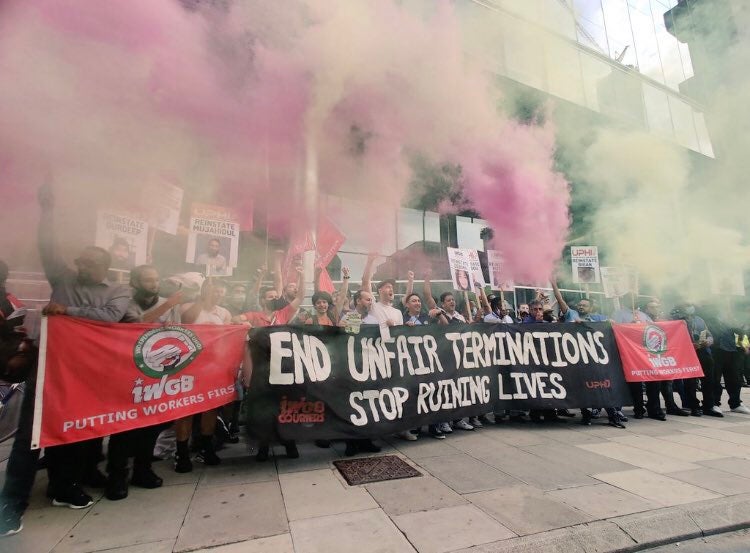Living Wage Foundation rails against insecure work as Labour belatedly wakes up
Nearly four million suffer from insecure work and nearly half have spent time away from their jobs through the pandemic. Labour’s new deal for working people is sorely needed

Your support helps us to tell the story
From reproductive rights to climate change to Big Tech, The Independent is on the ground when the story is developing. Whether it's investigating the financials of Elon Musk's pro-Trump PAC or producing our latest documentary, 'The A Word', which shines a light on the American women fighting for reproductive rights, we know how important it is to parse out the facts from the messaging.
At such a critical moment in US history, we need reporters on the ground. Your donation allows us to keep sending journalists to speak to both sides of the story.
The Independent is trusted by Americans across the entire political spectrum. And unlike many other quality news outlets, we choose not to lock Americans out of our reporting and analysis with paywalls. We believe quality journalism should be available to everyone, paid for by those who can afford it.
Your support makes all the difference.The Labour Party has belatedly woken to the problem of insecure work with its “new deal for working people” in which flexible working would be the default position and workers, including the gig economy’s dependent contractors, would get some important rights from the start.
This represents what could be a very good issue for the party, one that should have a much higher place on the political agenda. The reason is made clear in a report the Living Wage Foundation is publishing today.
It puts the number of people in insecure work at 3.7 million, based on official figures, and points out that low-paid workers in this type of employment have been at a greater risk of losing work due to Covid-19 than their peers.
Nearly half (46 per cent), for example, have been away from their job through the course of the pandemic, mainly due to having been furloughed, which, of course, means a 20 per cent pay cut, compared with less than a fifth (17 per cent) of their peers in more stable forms of employment earning more than the Foundation’s (voluntary) living wage.
To delve a little deeper than the Labour Force and Family Resource surveys, from which the data was culled, the Foundation commissioned Survation to run a poll of 2,021 employees, the results of which further highlight how unpredictable working hours can be and the impact job insecurity has on the family life, health and the ability of workers to do things most of us take for granted: planning our lives and suchlike.
Of those paid less than the living wage, the survey found 12 per cent received under 24 hours’ notice of working hours, shifts or work schedules, nearly half (49 per cent) received less than a week’s notice and more than two thirds (68 per cent) were given less than four weeks’ notice.
Forty-two per cent had experienced unexpected cancellations of shifts and of those, 28 per cent received no payment. Nearly all lost some pay.
Short notice periods that hit the ability to plan working and personal lives and threaten to tip shaky household finances off a cliff are a problem for hundreds of thousands of workers.
All this, obviously, plays into the Foundation’s Living Hours campaign against insecure work. It runs alongside the Living Wage campaign, which has proved remarkably successful.
I’ve said before that work represents a wedge issue that the Labour Party could and should exploit if it was just able to put its internecine internal warfare to one side and concentrate on winning elections. It is also a marriage issue because it unites disparate parts of the party’s voting base.
Problems at work are experienced by most people at some point. Insecurity, ill treatment, a lack of rights, are generation-spanning problems. The Foundation’s data shows that those most at risk from insecure work are, for example, the very youngest and the very oldest workers.
That Britain could, and should, do better by them is a message that will probably be heard by Labour’s traditional supporters, who are often at the sharpest end of these problems, but also by its newer, more prosperous, socially progressive backers. They may have children. They may not be terribly comfortable at the prospect of them entering a workforce in which their employers are allowed to trample on them while they’re earning poverty pay.
The Conservatives’ record on this subject is fairly grim. Under their leadership, workers have been handed a pair of cheap trainers and a disposable torch for a night hike through a stinking swamp. The message to those entering the labour market for the first time? You’re on your own, kiddo.
It’s been left to the unions to make all the running when it comes to securing improvements for gig workers, mostly by waging long – and expensive – battles through the courts.
Now it’s woken up to the issue, Labour should continue to draw attention to it and drive home the message again and again and again that it can and will deliver something better. This is a potentially winning theme that could, if correctly exploited, give the party’s steadily improving poll ratings a much-needed shot in the arm.
Join our commenting forum
Join thought-provoking conversations, follow other Independent readers and see their replies
Comments